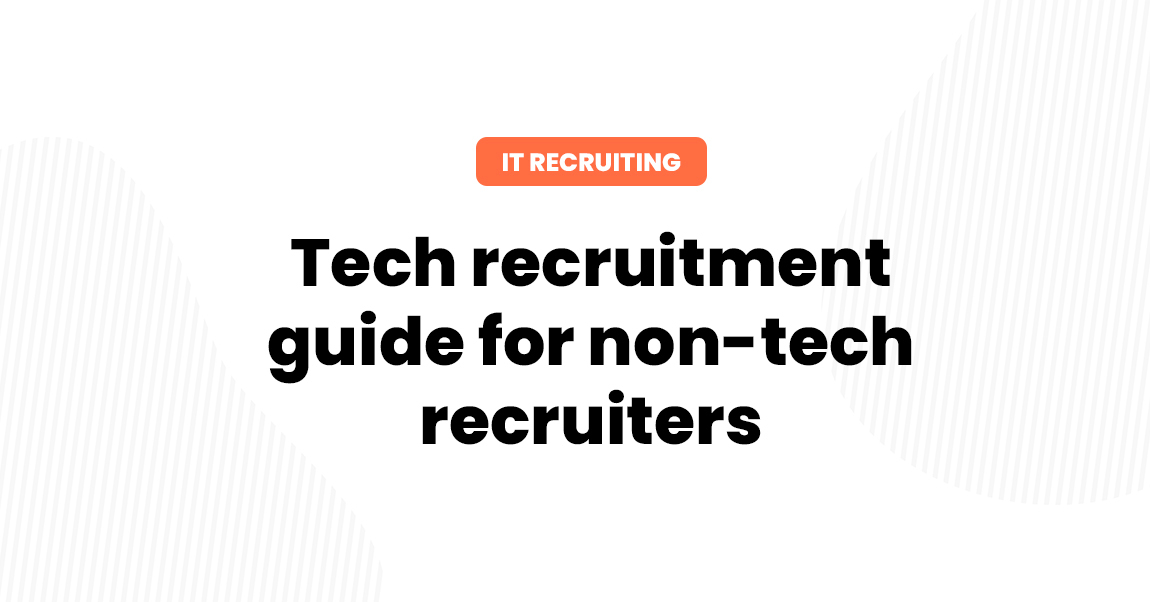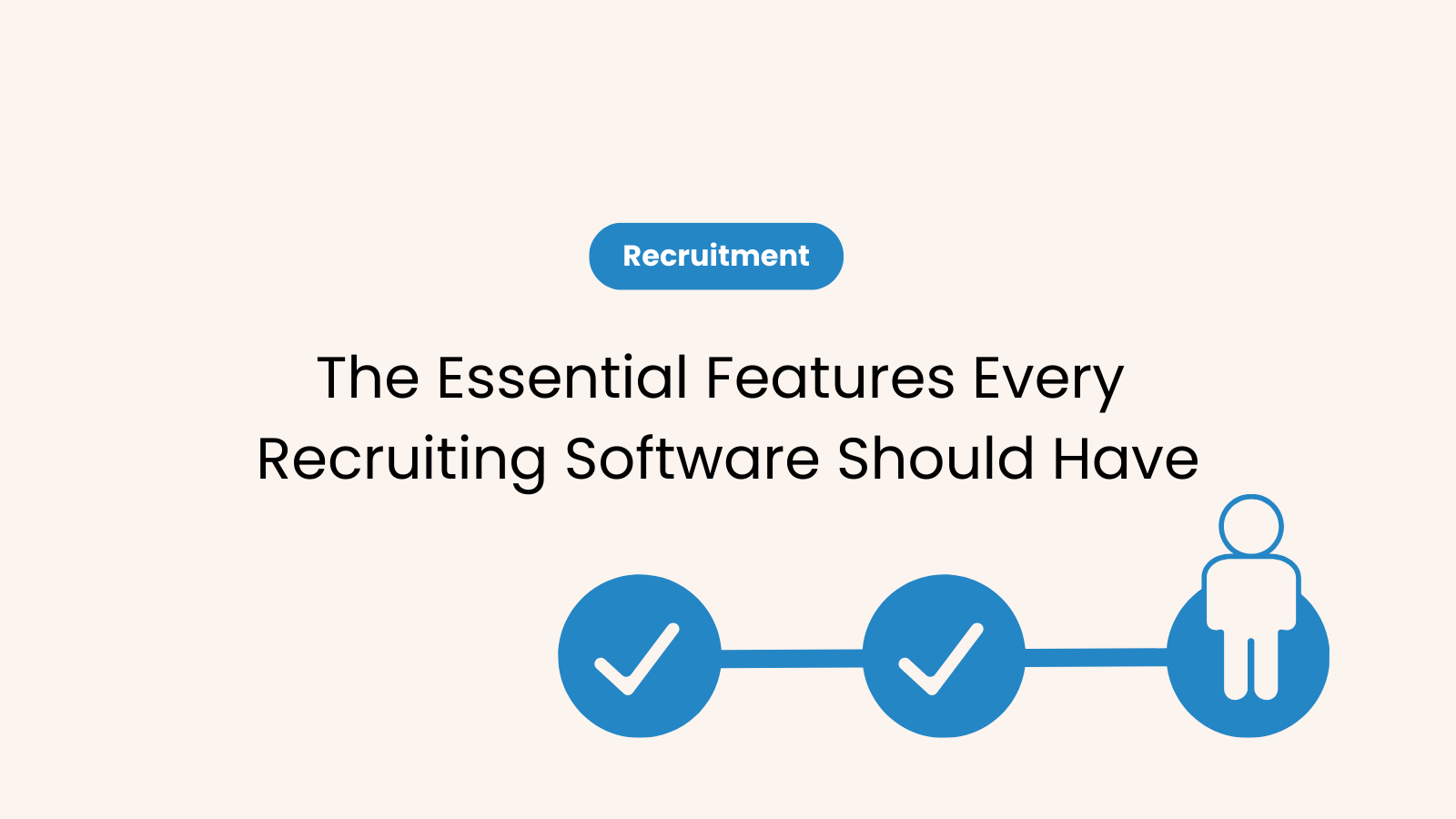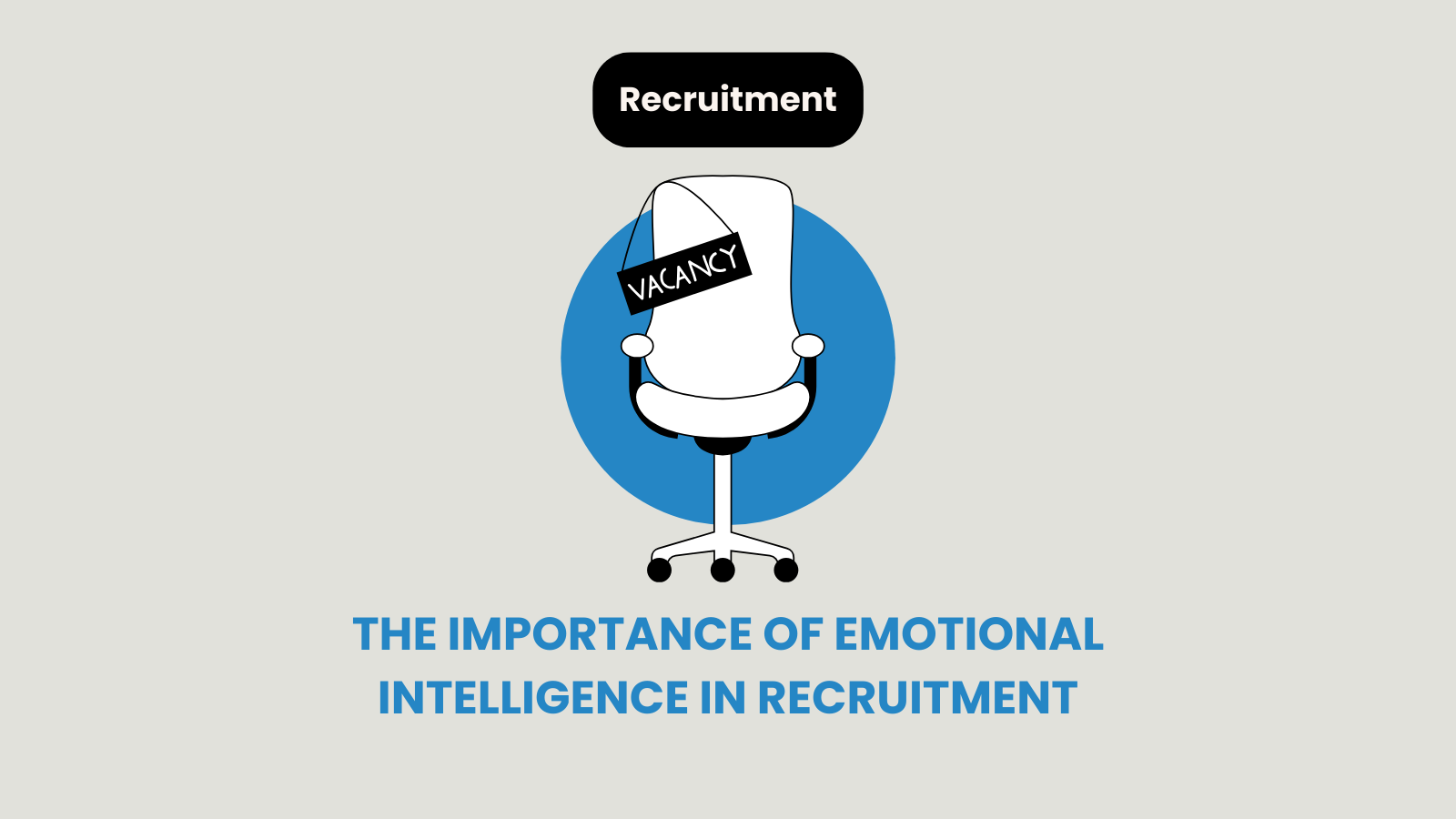A technical recruiter is the ultimate career choice for many. And while some think that getting into this field is a piece of cake, others are still hesitating and scrolling through articles seeking the most comprehensive roadmap. So, here it is – your best & most efficient tech recruitment guide for non-tech recruiters.
First, we’ll define the role itself and draw a few parallels between techies and their fellow talent sourcers from other industries. Then, we’ll cover the set of key skills each (successful) technical recruiter needs. And finally, we’ll explain the necessary steps & offer a few actionable tips that will help you kickstart your brand-new path. Ready?
What is a technical recruiter?
Recruitment is a pretty vast field. And although its main objectives are always similar, regardless of the precise industry, niche, or firm, the sets of skills and expertise needed to hire some professionals do differ. And a lot! So, a technical recruiter is, in fact, a unique character. What separates them from their colleagues in other fields is in-depth knowledge of specific technologies, tools, and more. So, their duty is to find (and attract) candidates who have certain familiarities and abilities that are key to fulfilling a company’s actual hiring needs. In other words, these candidates have to possess specific skills, qualities, and experience. And it’s up to tech recruiters to spot them, recognize their potential, and ensure that their expertise and aims match the company’s goals and expectations.
What is the difference between a recruiter and a technical recruiter?
We’ve briefly covered some of the essentials and masteries all great technical recruiters absolutely need. But what’s the true difference between them and their non-tech peers? What does an IT recruiter’s day look like?
Let’s start with the basic term first. So what is a non-technical recruiter? Mainly, their roles entail connecting with potential candidates and filling currently open positions. They reach out to perspectives online and offline. Once they get in touch, it is up to recruiters to take charge of screening applications and resumes, offer support to their hiring managers, and coordinate the entire process.
As for the recruiters who specialize in IT roles, their daily responsibilities involve a lot more sourcing. And being ghosted, for that matter. Because, to put it simply, the market is quite fierce. And the massive demand for experienced tech experts just keeps on growing. So, even though IT firms, in-house HR and recruiting professionals, and every recruitment agency rely on career pages, social media, and job boards, the truth is that attracting top talents is still a major challenge. And these recruiters do have lots on their plates!
Still, there are a few correlations and parallels. Both types of recruiters share some essential traits. In fact, they all must be resourceful, pleasant, great communicators, and excellent listeners. But the principal difference is based on the profiles of people they source and hire. And the hard skills (+ terminology) these hiring processes and approaches require.
What skills does a tech recruiter need?
According to Statista, the number of developers in the world will be on the rise in the years to come. In fact, studies show that it will reach nearly 28.7 million people by 2024. But still, as the entire industry keeps on progressing, these skilled IT talents will always be in-demand. And probably even more so than today.
So, to get the best results and triumph in a brutal talent market, recruiters must improve their skills regularly. Because only if they amplify their knowledge of the hot, new technologies and follow the companies that are changing the game can they spot and attract the talents that have precisely what it takes. Now, here’s a brief list of the key skills all recruiters must acquire & boost:
- Excellent written and verbal communication,
- Highly developed organizational skills and time management,
- Astonishing ability to negotiate while staying honest and pursuing a mutual benefit,
- A knack for analyzing people and reading the situations accurately,
- A fresh approach and state-of-the-art tactics,
- A curious mind and the tendency to grow continuously.
Finally, it’s crucial to have all-embracing company and industry knowledge. Also, following the hottest market trends and knowing about the gaps that must be overcome is imperative for successful recruiting experts.
How to get into tech recruiting? [a quick guide to kickstart your career]
If you’re a tech recruitment enthusiast, make sure to get all the components that will help you succeed in this field. And this simple guide for non-tech recruiters will lead you through all the imperative actions and necessary steps. So get ready to start here:
- Educate yourself but also work on your non-academic skills (like negotiation, listening, body language, and more) and form a strong background.
- Discover useful recruitment tools and be prepared to juggle multiple tasks and roles while using these gizmos that will help you stay productive and save time.
- Rely on data and learn how to evaluate your recruitment efforts; Explore some analytical tools and ensure to follow the most significant metrics.
- Obtain a clear understanding of your target audience and both active and passive candidates; Do your very best to track and truly understand their needs and preferences.
- Learn about the elements that build a positive candidate experience; Start with a clear, engaging, and inclusive job ad; Then, pay close attention to the ways recruiters communicate and how your brand as a whole is being represented and boosted.
And we saved the best for last. The final step is the one that should be perpetuated through the entire tech recruitment career. Never stop learning. Tech recruiters must keep their knowledge and masteries up to the minute. And that’s the ultimate goal & way to thrive.
💡 Pro tip 1: Collect all the information about tech positions
The proven way to get comfortable when recruiting a tech professional is to get more profoundly familiar with what they do and keep yourself acquainted + refreshed about the basics. Aside from reading blogs and books and talking to developers and other (more experienced) recruiters, you could listen to some podcasts about software engineering and similar topics. Explanatory videos on YouTube and even TED talks can help you out too. Finally, joining online communities, groups, and forums will help you understand how it all works, which roles are in-demand, what talents want, and so on.
But essentially, it’s paramount to find out everything you can about the open positions your company or client has. Read the responsibilities and requirements, and then go on a reading & learning spree. Use Google, Twitter, Reddit, and every other source you can find. Speak to the people in charge of hiring, and try to get an insight or two from the devs.
💡 Pro tip 2: Explore online courses
There are many online courses that can help you land a new job – remote or on-site. Or they could just help you boost a few skills needed to nail a painless side gig. Either way, these types of extra education are always helpful. So, be sure to check out Udemy and Coursera. Their upcoming programs for spring 2022 include interviewing basics, the introduction to a shorter and smoother recruitment process, sourcing tips & tricks, and more. Moreover, there are courses that will help you understand what an efficient onboarding process looks like.
Learn how to recruit tech talent in 3 easy steps
The shortest and sweetest tech recruitment guide for non-tech recruiters can be summed up into three crucial steps. So first, it’s about understanding who your candidates are and what they want. Then, the next step teaches you to get ready for real one-on-ones and interviews. And finally, it comes down to encouraging a noob to reach out and grab all the extra information and knowledge. Sounds good? Let’s dive in deeper.
Understand tech professionals & what they really want
Even though most developers aren’t actively looking for a new job, they still learn a lot about the companies through their content and social media. According to StackOverflow, tech experts pay attention to blogs, news, and videos. So, starting to revise and renew the content a company promotes is always a good idea.
However, what is it that these professionals seek? How to stand out? And finally, how can a non-tech recruiter understand their preferences? Actually, it’s quite easy:
- Track and read (+ watch) topic-specific content other firms post to understand how it all works. Then, strive to share related posts on your pages.
- Visit online and offline events and conferences and talk to other guests and participants to hear about their ideas, experiences, and opinions.
- Connect with more industry specialists through your colleagues’ networks.
Pay attention to those things that really matter. For instance, the vast majority of tech people enjoy freedom and flexibility. And if that’s what your company represents, don’t fail to mention & highlight it. It’s mainly about the extra days off, remote work, flexible working hours, and the excellent work-life balance. Also, employee development and career growth are crucial to most developers and engineers. So you better be sure that your company’s offer is aligned with these top priorities – and that you’re promoting them rightly. Regular conversations and asking for feedback can help you realize what else is there and what your target crowd truly needs.
Master the interviews by preparing in advance
Everyone who’s about to step into the world of recruiting (especially those getting ready to source and hire developers, engineers, and other IT professionals) feels a little something like a tingling sensation in their self-confidence. And there’s a name for this phenomenon. It’s called the imposter syndrome, and we’ve all been there. So, the best remedy to eliminate these negative thoughts and lack of belief in your own success is to prepare thoroughly before each interview. And more. Practice your communication skills, learn about sales, step into the world of marketing and employer branding.
But be ready to nail the basics first. So here’s what to cover and grasp before an interview:
- Approach every candidate as someone without a technical background and ask them to explain their experience and technologies they work with from scratch & by using simple words.
- Ask them to describe the projects they have worked on. Encourage them to mention the parts and assignments that were particularly interesting, and let them talk about the pain points they have bumped into. Make sure to find out if they’ve had some experience with projects similar to those your team or client’s team is working on.
- Let them speak about the type of work environment they’re comfortable with and how they stay motivated. Learn whether they’re more productive when working remotely or on-site. Also, be sure to check out which perks and benefits they appreciate and enjoy the most.
Before you start to interview a candidate, it is best to keep a list of key questions you will certainly ask. It’s always a good idea to have a stricture in mind and to determine the right direction. However, don’t forget that the precise flow can change. And it should. Because these screenings and interviews should always represent a natural, pleasant, and fluent convo.
Rely on your colleagues: especially technical experts and more experienced recruiters
Guess who the ultimate master of programming skills and languages is? That’s right, programmers themselves are the absolute best people to go to when you need clarification or a comprehensive guide. So, if you land a job as an in-house tech recruiter, you’ll have several valuable sources of information. However, once you start a new career in a recruitment agency, the most skillful people at your disposal are fellow recruiters and talent acquisition specialists. Reach out to those who have a broad knowledge. Ask them a few extra questions regarding the needed skill sets listed in a job description.
Moreover, invite them to participate when you interview a candidate. What will you get by doing so? Well, there’s a matter of an improved recruitment process and verified results. And you’ll gain quite a few effective tips and useful insights.
👉 Bonus points to complete a technical recruiting guide for non-tech recruiters
If you want to build an effective recruiting funnel, it’s essential to follow certain patterns. So, be sure to understand and be guided by the necessary steps toward a favorable outcome and a successful new hire:
- First, make sure to identify your target audience and figure out which channels offer the best fits and most value,
- Then, have a clear plan of how your candidates will be evaluated and explore tech skill assessment platforms,
- Learn what a well-written job description is like, and be sure to spot any gaps, vague paragraphs, and phrases that won’t appeal to your potential hires,
- Remember to keep the conversation going and update each talent in your pool regularly about their progress; Give relevant and objective feedback, and avoid generic emails that don’t offer an actual comment on the candidates’ knowledge, performance, and the impression they’ve made.
Finally, get a few insights and components needed for the final stage of the recruitment process. Get ready to make a job offer. Aside from an adequate salary and benefits package, it’s crucial to provide some extra information about the scope of work and precise expectations. Ultimately, be sure to allow the candidates to delve into this official document and ask some additional questions.
Fill in the blanks & start a successful career in tech recruitment
Are you ready to kickstart a new career and become an expert in hiring developers and other IT specialists? Well, you should start your journey by following the steps described in this simple tech recruitment guide for non-tech recruiters. Because moving gradually and filling in the blanks one at a time is the ultimate tactic and a tested way toward a successful recruiting career. So grab hold of the info about the programming languages, frameworks, tools, libraries, and everything else ASAP. Soak in these insights & make sure to refresh your industry knowledge + soft skills regularly.




